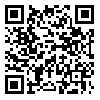Volume 17, Issue 1 (2010)
EIJH 2010, 17(1): 47-66 |
Back to browse issues page
Download citation:
BibTeX | RIS | EndNote | Medlars | ProCite | Reference Manager | RefWorks
Send citation to:



BibTeX | RIS | EndNote | Medlars | ProCite | Reference Manager | RefWorks
Send citation to:
Kord Zafaranlu Kambuziya A, Momeni N. Specifying Power in Language with Introduction of New Signs of Power. EIJH 2010; 17 (1) :47-66
URL: http://eijh.modares.ac.ir/article-27-10739-en.html
URL: http://eijh.modares.ac.ir/article-27-10739-en.html
1- Department of Linguisties, Tarbiat Modares University
2- Tarbiat Modares University
2- Tarbiat Modares University
Abstract: (2928 Views)
Power is a social phenomenon, which refers to the ability of its holders to compliance or obedience of other individuals to their will. This superiority is caused by different factors including social role, sex or even a particular style of speech. This study aims at presenting comprehensive definition of power, its role in terms of different speech styles of language and its signs. Therefore, the authors can measure power in language more carefully, recognizing new signs. In fact, power in language means avoiding linguistic uncertainty variables (filler, pause…) and using some linguistic signs (like following standard accent, etc…). "lengthening", "tag question (hear-oriented, speaker-oriented)" and "use of English word" are studied for the first time. In fact, we want to know if these three factors can be considered as linguistic uncertainty variables showing powerless speech. Sample research is 30 male managers at the age of 30-40. The results showed "lengthening" and its different kinds are one of the uncertainty linguistic variables showing powerless speech style.
Received: 2008/12/7 | Accepted: 2009/11/30 | Published: 2010/02/20
| Rights and permissions | |
 |
This work is licensed under a Creative Commons Attribution-NonCommercial 4.0 International License. |







